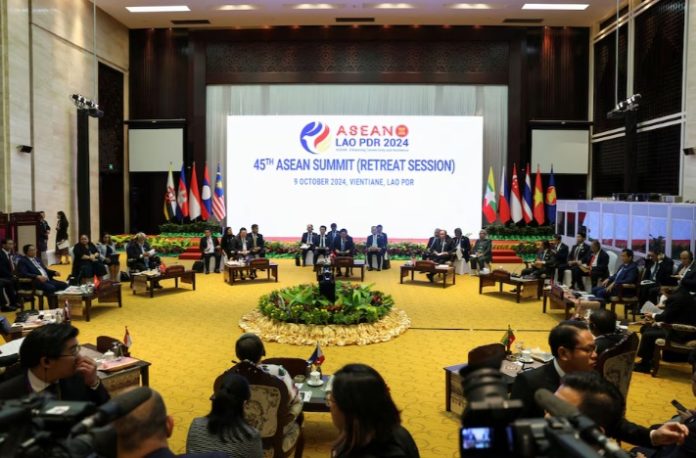China has no right to represent Taiwan, but the island is willing to work with Beijing to combat issues such as climate change, Taiwanese President Lai Ching-te said on Thursday.
“The People’s Republic of China has no right to represent Taiwan”
Lai, who took office in May after being elected in January, is detested by China, which calls him a “separatist.” Beijing considers democratically governed Taiwan its territory, a view Lai and his government reject.
Delivering a keynote speech before the presidential office in Taipei, Lai reiterated that the Republic of China – the island’s official name – and the People’s Republic of China are “not subordinate to each other.” He also said:
“On this land, democracy and freedom are growing and thriving. The People’s Republic of China has no right to represent Taiwan.”
Taiwan’s resolve to defend its sovereignty, maintain peace in the Taiwan Strait and seek equal and honourable negotiations with China remains unchanged, Lai added. He also said:
“I will also uphold the commitment to resist annexation or encroachment upon our sovereignty.”
But he also suggested co-operation with China:
“We are willing to work with China on addressing climate change, combating infectious diseases, and maintaining regional security to pursue peace and mutual prosperity for the well-being of the people on the two sides of the Taiwan Strait.”
Taiwan had “no so-called sovereignty”
In Beijing, China’s foreign ministry rejected Lai’s proposals, saying Taiwan had “no so-called sovereignty” as it was part of China and that Lai was trying to “deliberately sever” the historical ties between the two countries. Ministry spokesperson Mao Ning told a regular news briefing:
“It again exposed his stubborn stance of Taiwan independence and sinister intention of increasing tensions in the Taiwan Strait to seek political gain.”
Lai added that he hopes China can meet the expectations of the international community, apply its influence and co-operate with other countries to end and conflicts in Ukraine and in the Middle East. He said:
“And we hope that it will take up its international responsibilities and, along with Taiwan, contribute to the peace, security, and prosperity of the region and the globe.”
Military drills
Taiwanese and Western officials have warned that China may hold new military drills in response to his speech.
A senior official from Taiwan’s presidential office, speaking to reporters after the speech, said Lai extended an olive branch to China and used a ‘positive narrative’ in describing the government in Beijing.
According to the official, who spoke on condition of anonymity, it is not Taiwan that is provoking or seeking to change the status quo, but China does not need an excuse for military action. Adding that Taiwan is closely monitoring the situation, the official said:
“They are ready and waiting.”
China has no reason to use Lai’s speech as a pretext for military pressure, the US, Taiwan’s most important international supporter despite its lack of diplomatic ties, said on Wednesday. Lai has repeatedly offered talks with Beijing but has been rebuffed. He says only the people of Taiwan can decide their own future.
Philippines challenges China over South China Sea
Philippine President Ferdinand Marcos Jr. challenged Chinese Premier Li Qiang over recent clashes in the South China Sea at a regional summit on Thursday, as fears grow that conflict could erupt in the disputed waters.
Li met leaders of the 10 member countries of the ASEAN at their meeting in Laos after a day of discussions dominated by Myanmar’s civil war. There have been a series of violent clashes between Chinese and Philippine vessels in recent months in waters around disputed reefs and islands in the South China Sea.
Marcos raised the issue in his meeting with Li, saying “you can’t separate economic co-operation from political security,” a Southeast Asian diplomat who attended the meeting told reporters.
The summit with Li was largely focused on trade and came on the same day the premier met Australian Prime Minister Anthony Albanese, who said Beijing had agreed to lift sanctions on Australia’s lucrative lobster industry.
Calls for respect for international law
ASEAN leaders on Wednesday reiterated long-standing calls for restraint and respect for international law in the South China Sea, according to a draft statement from the summit’s chairman. The increasing frequency and intensity of clashes in the disputed waters has heightened fears that the situation could escalate. Singapore’s Prime Minister Lawrence Wong told his fellow leaders at the summit on Wednesday:
“The South China Sea is a live and urgent issue with a real risk of an incident escalating into conflict.”
Beijing claims almost all of the South China Sea, a waterway of immense strategic importance through which trillions of dollars worth of trade flows annually. But several ASEAN members – the Philippines, Malaysia, Vietnam, Indonesia and Brunei – also have competing claims to various small islands and reefs.
The meeting with Li came after a series of bitter clashes, especially with the Philippines around the Spratly Islands. Chinese coast guard ships and other vessels have rammed, ditched and blockaded Philippine government vessels. US Secretary of State Antony Blinken arrived on Thursday and is expected to raise the South China Sea issue at talks with ASEAN leaders on Friday.
